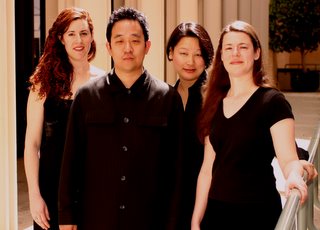Corigliano Quartet at the LoC
 Speeches before a concert should be considered emergency-only measures to illustrate difficult works that need context. Other than that they ought to be avoided, especially when most of the information is contained in the accompanying notes. I am afraid I’ll encounter that sort of speech many more times; to avoid writing similar introductions I will simply state the cause by writing “
Speeches before a concert should be considered emergency-only measures to illustrate difficult works that need context. Other than that they ought to be avoided, especially when most of the information is contained in the accompanying notes. I am afraid I’ll encounter that sort of speech many more times; to avoid writing similar introductions I will simply state the cause by writing “I usually don’t go to the events at the Library of Congress anymore, but with Charles’s ears contained elsewhere and with a program that included Aulis Sallinen, Elliot Carter, and Elizabeth Sprague Coolidge (as well as some Brahms), I simply could not resist. Aside – with that kind of a program seating was bound not to be a problem.
The Sallinen Oboe Quintet, Echoes from a Play, is a tone- and tuneful little thing. The “more than a touch of irony” that Sallinen says is concealed beneath that “overt tunefulness” escaped me entirely, but I enjoyed the work tremendously, nonetheless. Perhaps it was hiding in that beer-hall jaunty one-two–one-two pizzicato accompaniment of the lower strings. With a string quartet and superimposed oboe, the work establishes a modern-music atmosphere that other composers – Tan Dun comes to mind, although he, too, can be economical – need a few more instruments for. (Upon checking the program again, the work is not an “Oboe Quintet” but a work “for Oboe and String Quartet” – which is exactly how it sounds.) Oboist Thomas Gallant, who performed it with the Corigliano Quartet, had commissioned the work and played its world premiere 14 years ago at Ravinia.
Before the Carter, the four young members of the quartet introduced the Library of Congress’s instruments they were playing. Before I cry
These musicians minus second violin but with the continued support of Mr. Gallant got together for the 2001 Oboe Quartet of Carter’s – originally written for Heinz Holliger. I am not sure how much of the just-displayed sweetness of the strings came across to the audience in that work. With the oboe in prominent position, such works tend to sound like a nervous chicken on acid. I don’t love the work, I just like it… and I would not hold it against anyone if they didn’t. If the quartet is not one of Carter’s pieces that was particular meaningful to me upon first exposure, it certainly wasn’t ugly or abrasive even by modestly conservative standards. As long as I don’t have to pretend to “understand” such works, I find them an enjoyable listening experience. The audience, filtered by the principle of self-selection, appreciated it, too – which was heartening.
Both, the Sallinen and the Carter were written as complementary pieces for the Mozart Oboe Quartet. It would have been a delight to hear the Mozart between Sallinen and Carter, but it was not to be. Not to spare oboist Gallant, however: he had plenty more lung power which he put to good use in the Coolidge Sonata for Oboe and Piano from 1947. It is an ambitious work with a mighty and earnest struggle to claim some bittersweet, some pastoral, sweeping melody. If it were infused with more musical talent, it might have succeeded, too. As it was, we heard a work that struggles audibly, mightily towards greatness (however futile), an underrated work perhaps... and balm to those ears that had been offended by the Carter. Pedja Muzijevic accompanied gallantly.
The Corigliano Quartet was united again in the Brahms, where they played the ever-gorgeous Piano Quintet in F Minor, op. 34 from 1865, with Mr. Muzijevic. He had more opportunity here to display his skill and sensitive playing. Some intonation and tone-production problems of Ms. Bahn – now on first violin with the Kreisler-fiddle – were no hindrance to a warm embrace of this music. Ms. Bartson’s cello work was the most impressive and consistent of the four, alone in making the most of her instrument’s potential. If some of this sounds overly critical, it must be said that the concert was far more than the sum of its parts. In particular because of exciting and intelligent programming, it was an utterly enjoyable evening.
The concert was the Library of Congress’s Founders Day Concert and marked the 80th anniversary of the first concert. Then it included only works of E. S. Coolidge. With its great auditorium, good artists and vibrant (usually Coolidge-free) programs, it’s no wonder the concert series is still around and well.























































No comments:
Post a Comment